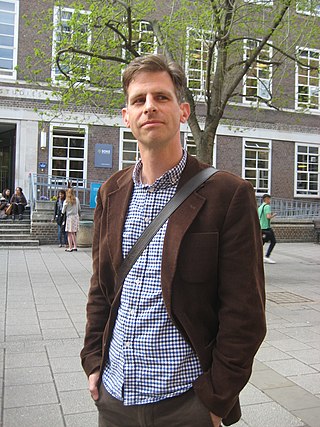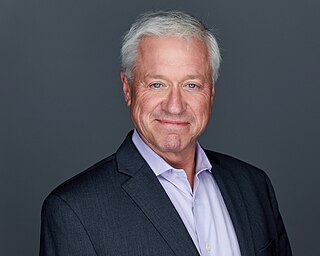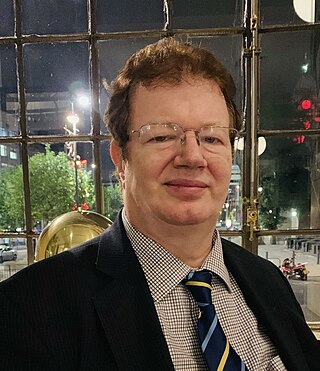Related Research Articles
In international relations (IR), constructivism is a social theory that asserts that significant aspects of international relations are shaped by ideational factors. The most important ideational factors are those that are collectively held; these collectively held beliefs construct the interests and identities of actors.

Francis J. Gavin is an American historian currently serving as the Giovanni Agnelli Distinguished Professor and Director of the Henry A. Kissinger Center for Global Affairs at Johns Hopkins University School of Advanced International Studies in Washington, D.C. He is also the chairman of the Board of Editors for the Texas National Security Review.
Glen O'Hara is an academic historian, who also writes on politics for a number of publications in the United Kingdom. He is professor of modern and contemporary history at Oxford Brookes University.
Gregory S. Mahler is an American political scientist with a general interest in comparative politics, and more specific interests in legislatures and constitutionalism.
Robert Bruce Ware is Professor of Philosophy at Southern Illinois University Edwardsville. Ware earned an AB in political science from UC Berkeley, an MA in philosophy from UC San Diego, and a D.Phil. from Oxford University. From 1996 to 2013, Ware conducted field research in North Caucasus and has published extensively on politics, ethnography, and religion of the region in scholarly journals and in the popular media. He has been cited as a leading specialist on Dagestan. His recent research has focused upon the philosophy of mathematics and physics.
Matthew T. Kapstein is a scholar of Tibetan religions, Buddhism, and the cultural effects of the Chinese occupation of Tibet. He is Numata Visiting Professor of Buddhist Studies at the University of Chicago Divinity School, and Director of Tibetan Studies at the École pratique des hautes études.
Fred Dycus Miller Jr. is an American philosopher who specializes in Aristotelian philosophy, with additional interests in political philosophy, business ethics, metaphysics, and philosophy in science fiction. He is a professor emeritus at Bowling Green State University.
David Nelken is a Distinguished Professor of Legal Institutions and Social Change Faculty of Political Science, University of Macerata and the Distinguished Visiting Research Professor, Faculty of Law, Cardiff University. His work focuses primarily on comparative criminal justice and comparative sociology of law. He was elected a Fellow of the British Academy in 2023.
Aneesh Aneesh is a sociologist of globalization, labor, and technology. He is Executive Director of the School of Global Studies and Languages at the University of Oregon and a Professor of Global Studies and Sociology. Previously, he served as a professor of sociology and director of the Institute of World Affairs and the global studies program at the University of Wisconsin, Milwaukee. In the early 2000s, he taught in the science and technology program at Stanford University and formulated a theory of algocracy, distinguishing it from bureaucratic, market, and surveillance-based governance systems, pioneering the field of algorithmic governance in the social sciences. Author of Virtual Migration: The Programming of Globalization and Neutral Accent: How Language, Labor and Life Become Global, Aneesh is currently completing a manuscript on the rise of what he calls modular citizenship.

Sam Julius van Schaik is an English tibetologist.

Michael D. Watkins is a Canadian-born author of books on leadership and negotiation. He is the Professor of Leadership and Organizational Change at the International Institute for Management Development in Switzerland.

Ehud R. Toledano is professor of Middle Eastern history at Tel Aviv University and the current director of the Program in Ottoman & Turkish Studies. His areas of specialization are Ottoman history, and socio-cultural history of the modern Middle East.
Robert V. Bartlett is an American political scientist, currently the Gund Professor of the Liberal Arts at University of Vermont, previously the Fulbright Distinguished Chair at the Polytechnic University of Turin, the Frank Church Distinguished Professor at Boise State University, Senior Fulbright Scholar at Trinity College Dublin, and a Senior Fulbright Scholar at the Centre For Resource Management at Lincoln University and University of Canterbury, He was educated at Indiana University Bloomington.
Peter Uvin is a Belgian-born American political scientist. He is a professor of Government at Claremont McKenna College. He was the Vice President for Academic Affairs and Dean of Faculty. He resigned that position on 28 August 2020. He is the author of four books, including Aiding Violence: The Development Enterprise in Rwanda, which won the Herskovits Prize of the African Studies Association in 1999.
Dan Stone is an English historian. He is professor of Modern History at Royal Holloway, University of London, and director of its Holocaust Research Institute. Stone specializes in 20th-century European history, genocide, and fascism. He is the author or editor of several works on Holocaust historiography, including Histories of the Holocaust (2010) and an edited collection, The Historiography of the Holocaust (2004).
Gregory Stephen Brown is an American historian specializing in French history and cultural History. His research regards "Enlightenment France and issues of 'self-fashioning,' performance and printing, patronage, and censorship." He is the General Editor and Senior Research Fellow at the Voltaire Foundation, University of Oxford, for the Oxford University Studies in the Enlightenment.
Penny Marie Von Eschen is an American historian and Professor of History and William R. Kenan, Jr. Professor of American Studies at the University of Virginia. She is known for her works on American and African-American history, American diplomacy, the history of music, and their connections with decolonization.

Christoph Hartmut Bluth is a professor of international relations and security at the University of Bradford.
Robert Dankoff is Professor Emeritus of Ottoman & Turkish Studies, Department of Near Eastern Languages and Civilizations at University of Chicago.
The "nuclear taboo" is a term used to refer to the international norm against the use of nuclear weapons. The existence of such a taboo is widely accepted but does not have consensus support among experts.
References
- 1 2 "Nina Tannenwald, Senior Lecturer in Political Science". Researchers@Brown. Brown University. Retrieved 2022-03-24.
- ↑ "Russia's invasion of Ukraine has eroded the nuclear taboo". The Economist. 14 June 2022. Retrieved 2024-08-11.
- ↑ "Lepgold Book Prize". Mortara Center For International Studies. Retrieved 2022-03-24.
- ↑ Reviews of The Nuclear Taboo:
- Atkinson, Carol (Summer 2009). Strategic Studies Quarterly. 3 (2): 141–143. JSTOR 26268566.
{{cite journal}}: CS1 maint: untitled periodical (link) - Burr, William (September 2008). "Keeping a tight lid on Pandora's box". Arms Control Today. 38 (7): 54–58. JSTOR 23628498.
- Freedman, Lawrence D. (November–December 2008). Foreign Affairs. 87 (6): 161–162. JSTOR 20699391.
{{cite journal}}: CS1 maint: untitled periodical (link) - Jones, Matthew (March 2008). International Affairs. 84 (2): 378–379. JSTOR 25144777.
{{cite journal}}: CS1 maint: untitled periodical (link) - Kroenig, Matthew (March 2009). Perspectives on Politics. 7 (1): 230–231. doi:10.1017/S1537592709090732. JSTOR 40407279. S2CID 144120355.
{{cite journal}}: CS1 maint: untitled periodical (link) - Liberman, Peter (Winter 2008–2009). Political Science Quarterly. 123 (4): 715–717. doi:10.1002/j.1538-165X.2008.tb01834.x. JSTOR 25655597.
{{cite journal}}: CS1 maint: untitled periodical (link) - Nolan, Janne (November 2008). The Nonproliferation Review. 15 (3): 539–542. doi:10.1080/10736700802407267. S2CID 143469743.
{{cite journal}}: CS1 maint: untitled periodical (link) - Readman, Kristina Spohr (July 2008). "Review". H-Net Reviews .
- Rappert, Brian (October 2009). Armed Forces & Society. 36 (1): 181–183. doi:10.1177/0095327X08326854. JSTOR 48608869. S2CID 144470820.
{{cite journal}}: CS1 maint: untitled periodical (link) - Roth, Ariel Ilan (December 2008). "Storming the castle: a constructivist attack on realism's home turf". International Studies Review. 10 (4): 819–821. doi:10.1111/j.1468-2486.2008.00843.x. JSTOR 25482034.
- Atkinson, Carol (Summer 2009). Strategic Studies Quarterly. 3 (2): 141–143. JSTOR 26268566.
- ↑ Slim, Hugo (September 2018). "Review of Do the Geneva Conventions Matter?". International Affairs. 94 (5): 1171–1172. doi:10.1093/ia/iiy155.